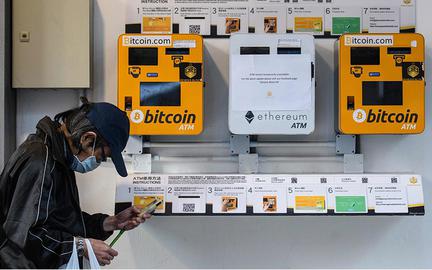The fever for Bitcoin and other digital currencies in Iran has been rising steadily since April 2019. A variety of locations, including schools, mosques, homes, factories, private companies and even stables have been used as sites for Bitcoin “mining."
According to one source, as of March 2018, Iranians had invested at least $2.5 billion in digital currencies. For an economy such as Iran’s, this is not a trifling sum.
Many people have joined in the hype to make some easy money, but there are many people in Iran who look at it from two other angles: as an opportunity to bypass sanctions and to engage in money laundering.
Chinese Bitcoin Farms in Iran
Mining one Bitcoin consumes 72,000 kilowatts of electricity, and the Iranian government offers a 500 toman (12 cents) subsidy for each kilowatt. In other words, each Bitcoin mined in Iran receives around 35 million tomans ($8,289) in government subsidies (As the time of reporting, one Bitcoin was worth US$11,297.60). These subsidies and the relatively cheap electricity have been attracting Chinese business people to Iran over the last year [Persian link].
“Since late 2018, the oil-rich Middle East country Iran has been a hotspot to Chinese miners,” reported the website 8BTC. “The country has attracted a growing number of bitcoin miners due to its cheap electricity, which is touted as cheap as $0.006 per kilowatt-hour. In contrast, electricity provided by hydropower stations in China’s southwestern region usually costs around 0.1 yuan ($0.015) per kilowatt-hour during the high water period in summer. While when winter comes, the cost would triple to $0.04 per kilowatt-hour.” In other words, the cost of mining one Bitcoin in China is 2.5 times the cost in Iran during the summer period and 6.6 times during the winter.
And in December 2017 Nima Dehghan, a blockchain researcher at a Tehran-based cryptocurrency startup called Areatak, told the website CoinDesk that the firm had been meeting with foreign investors who are looking at Bitcoin mining in Iran. “We have had investors visiting our farms from Spain, Ukraine, Armenia, France,” he said.
CNN also recently reported on Bitcoin in Iran. “Many Chinese bitcoin miners migrated to Iran in 2018 for its cheap electricity amid China’s crackdown on crypto mining,” the article read. “However, they’re finding the harsh environment in the authoritarian regime unwelcoming.”
Harsh environment aside, Feng Liu, who operates a Bitcoin mine, told 8BTC News that many Chinese crypto miners flocked to Iran in 2018 because electricity is cheap. Despite the fact that the Iranian government has banned energy-devouring crypto mining rigs at border checks, Feng Liu said that he was able to import 3,000 Bitcoin mining units into Iran last year with the help of several friendly border agents, who declared the units as computer processors. However, he did also say he had trouble importing additional mining gear. “The risk of mining rigs being detained and confiscated at the border is quite high,” he said. “It’s said that Iranian customs have so far confiscated at least 40,000 crypto mining rigs of various models.”
Bypassing Sanctions through Bitcoin
There are rumors that one of the main reasons Iranians are gravitating toward mining digital currencies, including Bitcoin, to conduct transactions is the US’ stringent sanctions on Iran’s banking and financial sectors. Islamic Republic officials are not denying this. Mohammad Sharghi, secretary of the Iran Blockchain Community has even said that mining digital currencies must be supported as a means to bypass sanctions.
“The government must extend the infrastructure for digital currencies to bypass sanctions and increase its supervision of this type of currency,” said Masoumeh Aghapour, member of the governing board of the Iranian parliament’s Economic Committee [Persian link]. “If the conditions in the country are favorable, we can use digital currency to conduct transactions with other countries and bypass sanctions."
Ali Hosseini, a digital currency expert, emphasized the importance of expanding the industry. “To bypass sanctions, we must use other [digital] currencies besides Bitcoin as well,” he said.
“The value of Bitcoin, the dominant online currency in the world, is treacherously unpredictable,” a New York Times article reported. “But it is an emerging front in the economic war between Washington and Tehran. Iran’s economy has been hobbled by banking sanctions that effectively stop foreign companies from doing business in the country. But transactions in Bitcoin, difficult to trace, could allow Iranians to make international payments while bypassing the American restrictions on banks.”
However, the New York Times article added that the “Iranian government has been slow to recognize the potential sanctions-evading possibilities of Bitcoin. But it is now considering the establishment of exchanges to facilitate trading, one official, Abdolhassan Firouzabadi, said recently ... The United States Treasury, well aware of the threat, is attempting to bring Bitcoin and the others into line. In recent weeks, in response to an internet fraud case originating from Iran, the Treasury imposed sanctions on two Iranians and the Bitcoin addresses, or ‘wallets,’ they had used for trading in the currency.”
“Treasury will aggressively pursue Iran and other rogue regimes attempting to exploit digital currencies,” the Treasury Department said in a statement.
A Convenient Tool for Money Laundering
The fact is that the practice of using digital currencies for money laundering is happening across the whole world. Various countries have been blaming digital currencies for a range of crimes, including money laundering, tax evasion and corruption.
In April, Iran’s Central Bank banned the country’s banks from dealing in cryptocurrencies, including Bitcoin, because of money-laundering concerns. “Banks and credit institutions and currency exchanges should avoid any sale or purchase of these currencies or taking any action to promote them,” announced a central bank circular about the ban on cryptocurrencies passed by Iran’s anti-money laundering body in December 2018.
A few days ago it was announced that two factories in the province of Yazd had been shut down because their low-cost electricity subscription was used to mine Bitcoins. But overall, so far Bitcoin miners have yet to encounter serious problems and they have carried on with their activities.
But how is Bitcoin used for money laundering?
In every Bitcoin transaction, the digital addresses of the sender and the receiver are registered. The address belongs to an individual but he or she does not have to reveal their identity to acquire an address. So any person can use the so-called “wallet” apps to acquire one or more addresses and use these addresses to make transactions in Bitcoin. The identity of the person is only revealed if he or she conducts these transactions in a money exchange shop or if a party to the transaction explicitly requests the identity. Otherwise, the person’s identity remains a secret.
Also, if a cryptocurrency exchange does not follow rules and regulations such as ascertaining the identity of the client and paying attention to various money laundering methods, that money exchange can be used for laundering dirty money. Not only does Bitcoin not come in coins or banknotes, it is not owned by banks and it has no central server. Transactions are done across the network and, by default, they are incognito. This feature of Bitcoin and some other digital currencies has encouraged some countries to use them to bypass sanctions or launder money — or both.
Related Coverage:
Zarif Admits Money Laundering is Rife in Iran, November 14, 2018
Iran Finally Signs Convention for the Suppression of the Financing of Terrorism, October 8, 2018
Money Laundering and Terrorism: Rouhani vs the Revolutionary Guards, September 7, 2016
visit the accountability section
In this section of Iran Wire, you can contact the officials and launch your campaign for various problems


























comments